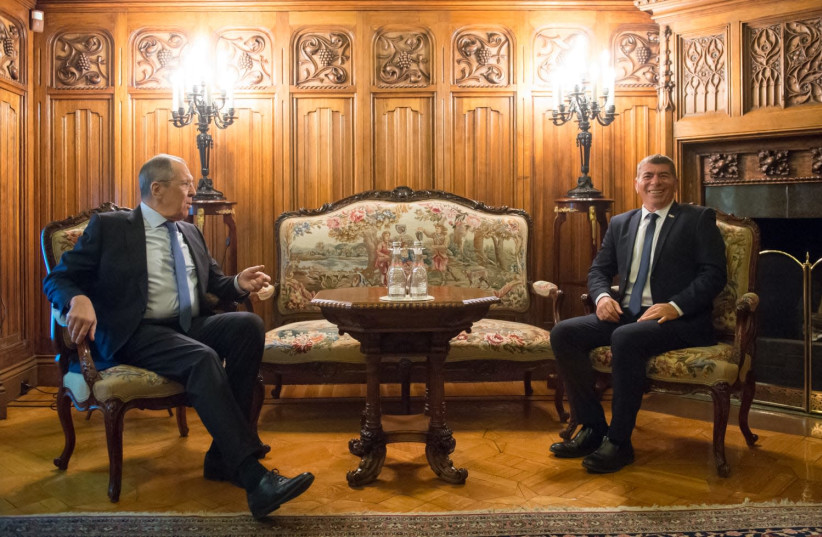Israel will continue to defend itself against Iranian actions in Syria, Foreign Minister Yair Lapid said in Moscow, following a meeting with Russian Foreign Minister Sergey Lavrov, amid concerns about Russian moves to curb Israeli strikes.
“Israel will not sit by quietly while Iran builds terror bases on our northern border [with Syria], or while Iran supplies advanced weapons to terror organizations – weapons intended to be used against us,” Lapid said.
There cannot be regional stability as long as Iran maintains a presence and continues to export terror, he warned.
“We will maintain our ability to defend ourselves in the face of threats from Syria and elsewhere,” Lapid added.
The foreign minister acknowledged Russia’s “key interests in the region,” and said that is why the “necessary and effective” military deconfliction mechanism between Moscow and Jerusalem exists.
On Sunday, a Russian-made missile launched from Syria landed in the Gush Dan region. Two weeks before that, the Russian military in Syria said the air defense system it supplied to Syria shot down 22 of 24 missiles launched by Israel.

Israel and Russia, which has soldiers in Syria, have a deconfliction mechanism regarding Israel’s aerial campaign to stop Iran from establishing bases near Israel’s borders.
That mechanism seems to have been going less smoothly of late, as the Russian military message on missiles came on the heels of a report in the London-based ASharq al-Awsat in July that Moscow believes Washington has given it a green light to foil Israeli airstrikes in Syria.
In response to a question from a Russian journalist, Lapid said that “Israel is not considering and never will consider returning the Golan Heights to Syria.”
Lapid also warned that Israel reserves the right to act against Iran’s nuclear program.
“Iran’s march toward a nuclear weapon is not only an Israeli problem, it’s a problem for the entire world,” he said, calling for a “strong and clear message” from the world to Iran.
“A nuclear Iran will lead to a nuclear arms race in the Middle East,” he warned. “The world needs to stop Iran from getting nuclear capabilities, no matter the price. If the world doesn’t do it, Israel reserves the right to act…Israel will not allow Iran to become a nuclear state, or even a nuclear threshold state.”
Lapid cited recent reports by the International Atomic Energy Agency that paint a “clear and very worrying picture” of Iran’s “rapidly advancing nuclear program without any effective supervision,” and the Islamic Republic’s “fraud, deception and outright lies” to cover it up.
“The reports demand an [IAEA] Board of Governor’s decision,” he said, ahead of an expected meeting in Paris on Friday.
Russia, however, has voiced opposition to such a resolution. Its ambassador to International Organizations in Vienna Mikhail Ulyanov tweeted during the Lapid-Lavrov meeting that “no action is needed” by the Board of Governors, which should “maintain traditional businesslike cooperation” with Iran.
That behavior was “affected primarily due to some external factors,” Ulyanov said, likely referring to the US departure from the 2015 Iran deal and subsequent sanctions.
“Under no circumstances the discussion [at the IAEA] should adversely affect the prospects of the Vienna Talks on JCPOA,” Ulyanov tweeted on Wednesday, referring to the 2015 nuclear deal.
US Special Representative for Iran Rob Malley, the chief American negotiator in the indirect talks with Iran to return to the 2015 deal, was also in Moscow on Thursday. A statement released by the Russian Foreign Ministry said Malley and Russian Deputy Foreign Minister S.A. Ryabkov will continue those negotiations, to which Iran has refused to return since June. They also emphasized “the significant contribution of the IAEA to the process of stabilization and ‘restart’ of the JCPOA.”
In Moscow, Lapid and Lavrov marked the 30th anniversary of relations between Israel and Russia, agreeing that Prime Minister Naftali Bennett and Russian President Vladimir Putin should meet soon. The details of the meeting will be determined by the Prime Minister’s Office and the Kremlin.
Lavrov called the date “very significant,” and said ahead of the meeting with Lapid that he was “looking forward to taking another step in developing the relations.”
Lapid emphasized “the great relations we have between our two countries...[which are] useful and fruitful to our people in terms of economics and culture.”
Tourism Minister Yoel Razbozov, who was born in Birobidzan, joined Lapid on the trip to Moscow.
Earlier in Moscow, Lapid laid a wreath at the Tomb of the Unknown Soldier in honor of soldiers that fell in World War II, in the name of the citizens of Israel.
“Israel appreciates the role of the Soviet Union in defeating Nazi Germany and the Red Army’s role in liberating the death camps,” the Foreign Ministry stated.
Lapid referred to Russia’s role in World War II and his own father’s story in his remarks to Lavrov.
“My father was a child in the Budapest Ghetto,” Lapid said. “He was destined to die. Then, one day, he heard people speaking a language he didn’t understand. My grandmother.... said: ‘It’s Russian...We are saved.’ The Red Army saved the world from tyranny and racism. They also saved a 13-year-old boy in the ghetto.”
